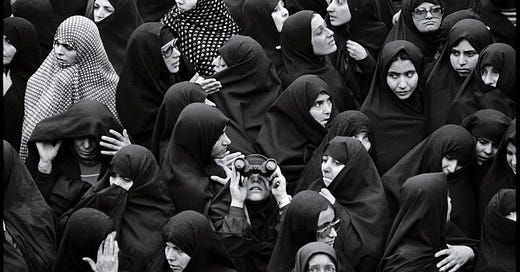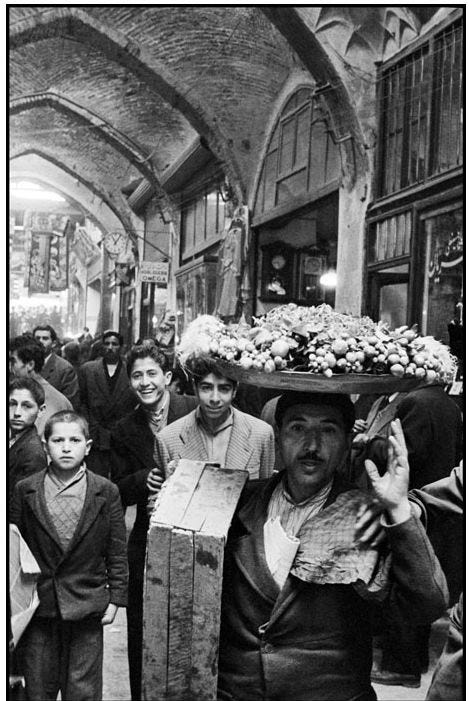In 2018, my family did a round trip through Iran. My parents wanted us to experience the country - a place I had, until then, only associated with my grandfather’s house in Rafsanjan - as a whole, with everything it had to offer. Over the course of two weeks, and with the help of a wonderful tour guide, we travelled across the major cities: Tehran, Karaj, Isfahan, Yazd, and Shiraz.
I remember thinking how beautiful this country was. Both my parents had left Iran when they were still young, and they both had always spoken of Iran’s beauty. Now, I could finally see it myself: grand deserts, beautiful forests, and bustling cities. But it wasn’t just the nature or the architecture that struck me. The most beautiful part of Iran were its people.
In Isfahan, we stayed at a family-run hotel built like a traditional Iranian garden. A still body of water stretched through the middle, with rooms lining the perimeter, each door opening out into the courtyard. Every night, the mother of the hotel manager cooked us food she had spent the entire day preparing. It was some of the best food I had ever eaten.
Of course, every Iranian man will claim that his mother’s cooking is the best (I am no exception). But this old woman in Isfahan made fesenjoon in a way I had never tasted before — sweet and sour at once, with a hint of crunch and with a polo so good it made you curse your body for having a natural limit to hunger. We sat on rugs in the courtyard to eat, and every evening, she would walk through the garden with a toothless smile, and ask if we liked the food and whether she should make more.
One night, following the Iranian tradition of tarof, she insisted we eat more — specifically dolmeh, vine leaves wrapped around rice and minced meat — even though we had just finished two full plates. Her son, probably in his thirties at the time, gave us the knowing smile of an Iranian who is at once apologetic and proud of his mother: a woman who cooked for an entire hotel and still found the energy to make guests try one more bite.
Isfahan stayed in my memory as one of the most beautiful cities I’ve ever visited. Experiencing the echo phenomenon with my brother in one of its great mosques, hearing strangers sing Gole Sangam under the Khaju Bridge and strolling through the bazaar with my parents — all became cherished memories. But what stayed with me most was the woman and her son running that small hotel. They embodied everything I loved about Iran: its warmth, its hospitality, its insistence that food be shared even when you say you’re full.
June 22, 2025
Today, Donald Trump ordered the bombing of three nuclear facilities in Iran — one of them in Isfahan. According to reports by Al Jazeera, American submarines launched missiles at the Isfahan Nuclear Technology Centre around 1:30 a.m. GMT. In an Oval Office address, Trump declared the facilities “totally obliterated” and insisted that Iran “must now make peace.” Israel’s Prime Minister, Benjamin Netanyahu, congratulated him on the “successful” strikes, claiming that the U.S. and Israel are bringing “peace through strength.”
The bombing comes on the heels of the June 13th escalation, when Israeli airstrikes triggered a full aerial offensive between Iran and Israel, resulting in the deaths of so far at least 224 Iranian civilians and 24 Israelis. The world now waits to see how Iran will respond.
The Atomic Energy Organization of Iran has released a statement, vowing it will not “allow the development of this national industry [...] to be stopped.” But what can Iran realistically do? Politically and geographically isolated, its options are limited.
A direct response, for example a strike on U.S. military targets in the region, risks igniting a far more dangerous conflict. It could even trigger a U.S.-backed coup, with Trump hinting in a message on Truth Social: “It’s not politically correct to use the term, “Regime Change,” but if the current Iranian Regime is unable to MAKE IRAN GREAT AGAIN, why wouldn’t there be a Regime change??? MIGA!!!” This is a scenario not without precedent. The memory of the 1953 CIA-led overthrow of Prime Minister Mohammad Mossadegh still lingers, unresolved.
Could Iran close the Strait of Hormuz? Technically, yes. But such a move would send shockwaves through the global oil market and likely provoke wider military retaliation, dragging multiple nations into a broader war. Already, the rhetoric surrounding today’s attacks feels like a grim echo of 2003 — the familiar invocation of “weapons of mass destruction” as a pretext for violence.
Perhaps Iran will choose restraint, as it did following the U.S. assassination of Qassem Soleimani in 2020. But even that would be a bitter kind of diplomacy — an act of control in the face of a superpower that rarely counts the civilians it kills.
I used to read news like this about other countries and go about my day. Not because I didn’t care but because I felt helpless. How could I change anything about the situation I was reading about?
But this is different. This is my parents’ country. It’s part of me. The Iranian government is not the Iranian people. The people are not faceless numbers. They are some of the warmest and most hospitable people I have ever met.
I wanted to remeber my experiences and bring them closer to others. Because I’m sure that no matter who you are, you would have loved these people too.
You would have loved Isfahan. To go there. To sit in that garden, eat that woman’s fesenjoon, and be gently forced to try dolmeh after already finishing two full plates. I’m sure it wouldn’t have mattered where you were from. You would have felt welcome.
Seven years later, I wonder what the son and his mother are doing now. Whether the hotel will still be standing in a few weeks. Whether it still is standing right now. Whether the kitchen is quiet. Whether the garden is empty. I wonder if any of this will make sense in the years to come — if speeches and strategies will ever explain why a place filled with food, song, and warmth had to become a target. In the end a complex conflict always has the same, simple outcome: a kitchen left cold, and a mother who will never walk through her garden again.









آنچه از دل برمیخیزد، به دل مینشیند. ❤
Enjoyed the piece!
I look forward to the one next Monday.